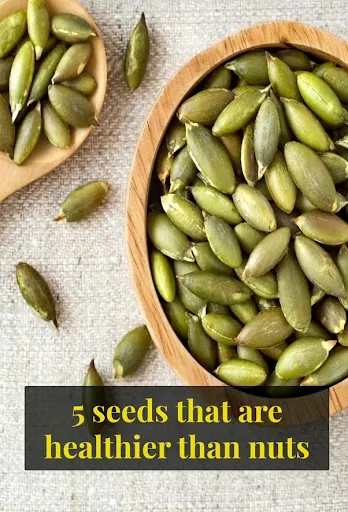In the ever-evolving landscape of health and nutrition, one truth remains constant: nature's smallest offerings often pack the biggest punch. Seeds, in particular, are miniature powerhouses, brimming with essential vitamins, minerals, healthy fats, and fiber.
Top 5 Healthy Seeds | Nutrition & Benefits
These tiny nutritional giants offer an easy way to boost your daily intake of crucial macro and micronutrients.
Why Incorporate Healthy Seeds into Your Daily Diet?
Adding a variety of seeds to your meals can provide numerous benefits:
Rich in Fiber: Essential for digestive health, promoting satiety, and managing blood sugar.
Source of Healthy Fats: Including monounsaturated and polyunsaturated fats, like omega-3 and omega-6 fatty acids, vital for heart and brain health.
Plant-Based Protein: A great option for vegetarians, vegans, and anyone looking to increase protein intake.
Abundant in Vitamins & Minerals: Packed with micronutrients like magnesium, zinc, iron, and B vitamins.
Antioxidant Properties: Help combat oxidative stress and inflammation in the body.
Let's dive into the top 5 healthy seeds you should be incorporating into your diet:
1. Pumpkin Seeds: The Mighty Green Kernel
Often enjoyed around autumn, pumpkin seeds are a fantastic year-round superfood. These often-eaten seeds are particularly high in phosphorus, beneficial monounsaturated fats, and omega-6 fatty acids, making them excellent for bone health and overall vitality.
Nutrients per Serving A serving of 1 ounce (approximately 28g) of whole roasted pumpkin seed kernels contains:
Calories: 126
Fat: 5.5 grams (rich in healthy fats)
Protein: 5.3 grams
Carbohydrates: 15.3 grams
Fiber: 5.2 grams (significant for gut health)
Tip: Enjoy them roasted as a snack, or sprinkle over salads and soups for added crunch and nutrition.
2. Sesame Seeds: Tiny Seeds with Big Benefits
Sesame seeds boast a comprehensive nutritional profile. Beyond their delightful flavor, they may also aid in lowering inflammation and oxidative stress thanks to their lignans and antioxidants. These tiny seeds are a staple in various cuisines globally and offer unique health advantages.
Nutrients per Serving A quarter-cup (approximately 36g) serving of dried sesame seeds contains:
Calories: 206
Protein: 6 grams
Fat: 18 grams (including polyunsaturated and monounsaturated fats)
Carbohydrates: 8 grams
Sodium: 4 milligrams
Fiber: 4 grams
Sugar: 0 grams
Tip: Use sesame seeds in stir-fries, sprinkle on roasted vegetables, or make homemade tahini.
3. Hemp Seeds: The Complete Protein Source
Often called "hemp hearts," hemp seeds are celebrated for providing complete protein, meaning they include all of the essential amino acids that your body cannot produce on its own. This makes them an exceptional plant-based protein source for muscle repair and growth.
Nutrients per Serving In 3 tablespoons (approximately 30g) of hulled hemp seeds, you’ll find:
Calories: 166
Protein: 10 grams (a significant amount for a plant-based food)
Fat: 15 grams (balanced omega-3 and omega-6 fatty acids)
Carbohydrates: 5 grams
Fiber: 1.2 grams
Sugar: 1 gram
Tip: Blend them into smoothies, sprinkle on yogurt or oatmeal, or use them as a topping for salads.
4. Chia Seeds: Fiber & Omega-3 Giants
Chia seeds have earned their superfood status, and for good reason. They are an incredible source of fiber, plant-based omega-3 fats (specifically alpha-linolenic acid or ALA), and numerous other nutrients, making them comparable to flaxseeds in their nutritional density. Their unique ability to absorb liquid and form a gel makes them versatile.
Nutrients per Serving A 1-ounce (28.35 grams) serving of chia seeds has:
Calories: 138
Protein: 4.7 grams
Fat: 8.7 grams (very high in Omega-3 ALA)
Carbohydrates: 12 grams
Fiber: 9.8 grams (nearly 35% of daily recommended intake)
Sugar: 0 grams
Tip: Create a nutritious chia pudding, add to overnight oats, or use as an egg substitute in baking.
5. Flaxseed: The Lignan & Omega-3 Champion
Also known as linseeds, flaxseeds are renowned for being exceptionally rich in fiber and omega-3 fatty acids, especially alpha-linolenic acid (ALA), which contributes to heart health.
Nutrients per Serving One tablespoon (10 grams) of whole flax seeds provides the following nutrients:
Calories: 55
Water: 7%
Protein: 1.9 grams
Carbs: 3 grams
Sugar: 0.2 grams
Fiber: 2.8 grams
Fat: 4.3 grams (high in Omega-3 ALA)
Note: For optimal absorption of nutrients, it's best to consume flaxseeds ground, as whole seeds may pass through the digestive system undigested.
Tip: Add ground flaxseed to smoothies, sprinkle over cereal, or mix into baked goods like muffins and bread.
Simple Ways to Incorporate These Healthy Seeds into Your Diet
Integrating these healthy seeds into your daily routine is incredibly easy:
Breakfast Boost: Sprinkle on oatmeal, yogurt, cereals, or add to smoothie bowls.
Baking & Cooking: Mix into muffins, bread, energy bars, or as a coating for chicken or fish.
Salad Toppers: Add a satisfying crunch to any salad.
Snack Smart: Enjoy them plain, roasted, or mixed into trail mixes.
By diversifying your intake of these top 5 seeds, you're making a simple yet powerful investment in your long-term health, supporting everything from digestion to heart and brain function.

